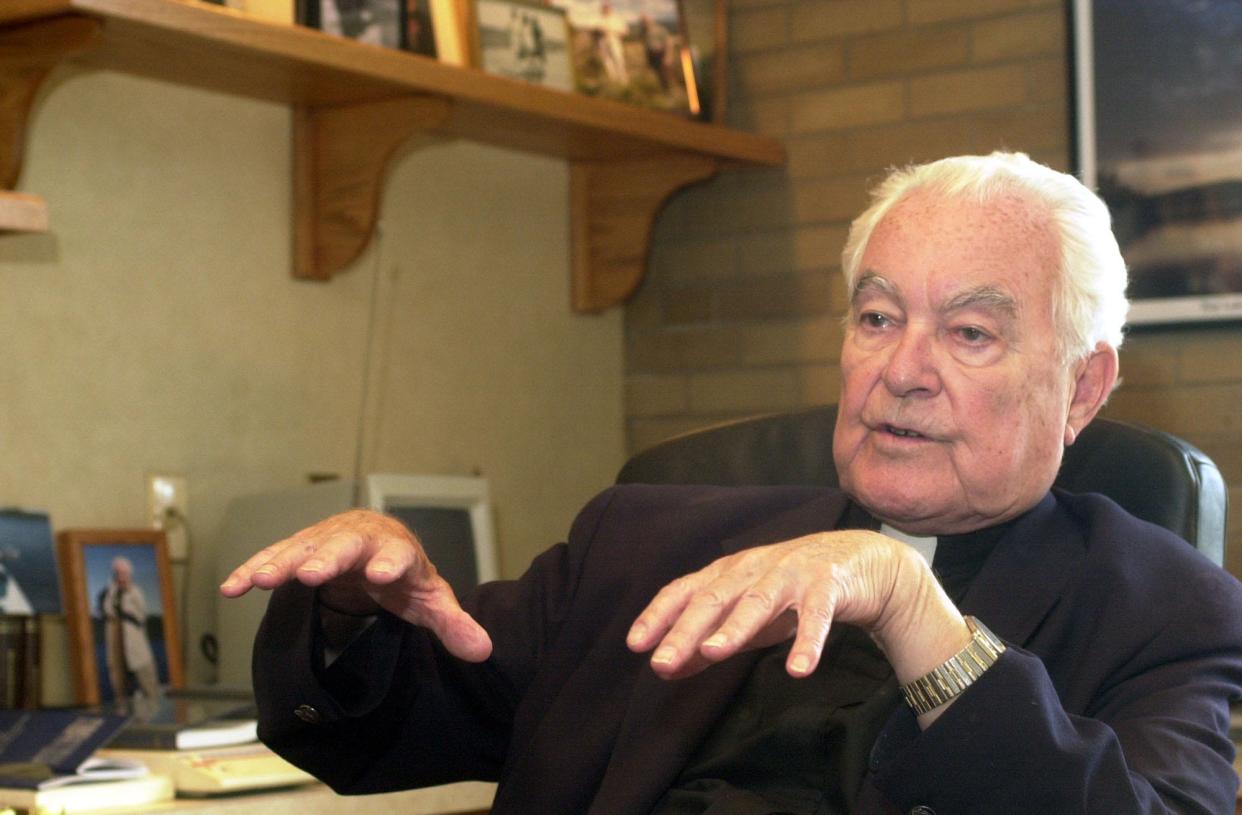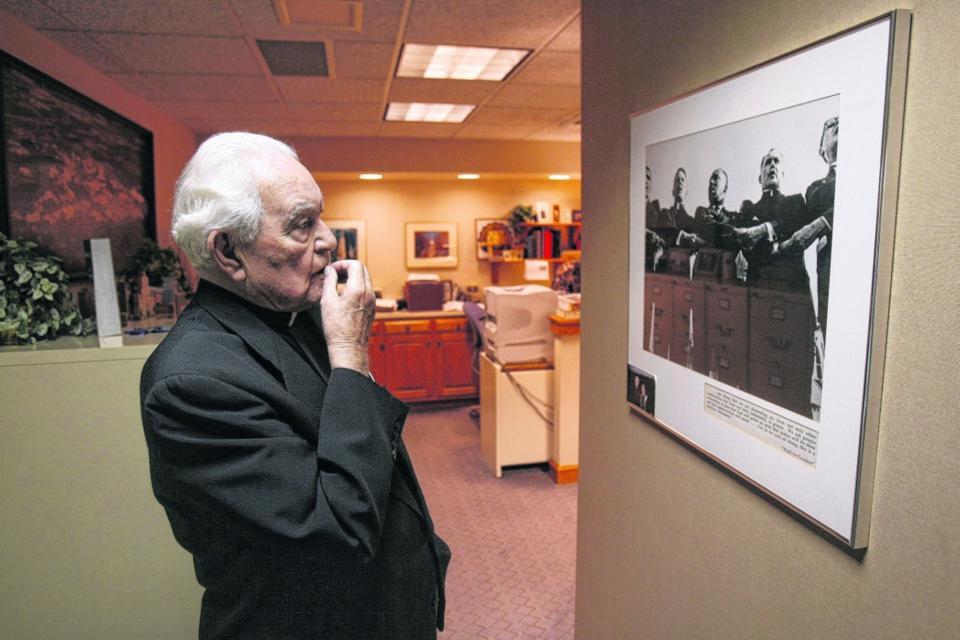From 2007: A Q&A with Hesburgh about Martin Luther King Jr., the Civil Rights Movement

- Oops!Something went wrong.Please try again later.
- Oops!Something went wrong.Please try again later.
Editor's note: This story originally appeared in the South Bend Tribune on Jan. 21, 2007.
SOUTH BEND — The Rev. Theodore M. Hesburgh served as president of the University of Notre Dame from 1952 to 1987. As a charter member of the U.S. Commission on Civil Rights, he knew The Rev. Martin Luther King Jr. personally.
Last week, as the country celebrated the life of the slain civil rights leader, Hesburgh met with staff writer May Lee Johnson to talk about his memories of Dr. King.
Q: Father Hesburgh, I understand that you had met Rev. Martin Luther King Jr. personally?
Yes, I met Dr. King many times.
Q: What were some of those times you saw and met with him?
We met in the 1960s, and those were turbulent times in the country. Black people were marching, going to jail, and little kids getting hosed, and it took a man with the moral leadership of Martin Luther King to bring it to the attention of the Civil Rights Commission and the country.
Q: What roles did the Civil Rights Commission play?
I had been on the Civil Rights Commission since its beginning in 1957. We had over 100 hearings all over the country, with King and black people at all the hearings.
We asked the tough questions and were given honest answers. Then we wrote the roughest, toughest law, the United States Civil Rights Act of 1964.
Q: Who was involved in getting the Civil Rights Act passed?
President Lyndon Baines Johnson was the only president that had the power to get the law passed. None of the others had the power that Johnson had, and even as a Southerner he got the bill passed.
That was the high-water mark in the Civil Rights Movement. Once you have a law, people respect the law. Once it was a law, the people respected it and things started to move along a lot faster.
Q: What did you see Dr. King's roles in the Civil Rights Act getting passed and the movement?
I would have to say that a big part of its passing goes back to Martin Luther King. King pressed for rights, and he wouldn't settle for just the rights of blacks and not the other. Not just the right to vote, but the right for all people to have human dignity.
Q: Dr. King was killed for his part in the civil rights revolution. What do you say about that?
King died as a martyr in that cause. In history, sometimes it takes martyrs to do great things. And while it was a terrible thing that Martin Luther King was shot and killed, the fact is that it was a turning point and it also gave then-President Johnson the impetus to pass that law (Civil Rights Law of 1964), although it was at a time in history when many in America didn't want it passed.
Q: What do you think Dr. King's legacy is?
Martin helped turn this country around at a time when it needed turning. It really took a black leader to give that kind of leadership, because it was the black people who were suffering.
Q: What kind of man would you say Dr. King was?
I can honestly say that Martin Luther King gave his life for all Americans, not just blacks but women Americans, who didn't have many rights in those days, and other minority people who had trouble with human rights. This law covers all of them.
And in that way, I say he was a great American because he helped change the face of America. Now there were many others, of course, who worked with him, and we on the Civil Rights Commission certainly worked hard, but I don't think we could have done it without the kind of moral leadership that Martin Luther King gave.
First, it took a certain kind of wisdom to know that what he was doing was the right thing to do.
Secondly, it took courage to stand against people who were willing to kill him, to shoot him, to say we're going to do this. And he used these famous words, "We Shall Overcome."
Q: Father Hesbugh, do you think we have overcome?
We did overcome. We've overcome prejudice, we've overcome bigotry, we've overcome ignorance. And all that was part of the legacy of Martin Luther King.
Q: Why do you think, 40 years later, no true black leader has been able to step up and lead black people like Dr. King did?
You see, great leaders are not common or numerous in any country.
Let's just look at the leaders of this country who fought for human rights: Thomas Jefferson, Abraham Lincoln and Lyndon Johnson. These men were a hundred years apart from each other, but it took all three of them -- one to put down the right words; secondly, one to get rid of the institution and free the slaves; and the last one passed laws so freedom and justice became the law of the land.
Q: How have we benefited from Dr. King's life?
We are the inheritors of his wisdom and courage, and for that we ought to be grateful to him.

Q: What was the most memorable time you spent with Dr. King?
Martin decided to put on a march against segregated housing on the south side of Chicago. So Mayor Daley was upset about it, because he said Martin was giving Chicago a bad name.
Well, it already had a bad name. So Mayor Daley said he wasn't going to take part in the march and prayer service. ... Because he didn't go, Cardinal Cody wasn't going to, either.
So here we have the top civic and religious leaders not going to the march, and I thought that was terrible. So I went up and while I was standing there someone pulled me up on the stage and the moment we locked arms, it was a good feeling between us and we always had good feelings for each other. I have that picture right here.
Q. Do you believe that Martin Luther King's dream has been achieved?
I think a great portion of his dream -- the difference between what America was like before his death and before the Civil Rights Act of Lyndon Johnson -- it's day and night.
What amazes me today is that the young students don't realize how bad it was. When I came to teach at Notre Dame in 1934, there were not any black students here. When I came back in to teach in 1945 after getting my doctorate, there was only one black student.
And today, we work hard to get good black students in Notre Dame. Again, I think it's important to get students today to recognize the history that this was not something that was easily achieved.
It took all the time from 1776 to 1964 -- that's a long time -- and it took three great men -- Jefferson, Lincoln and Johnson -- to get the dream realized.
Q: How can we preserve his dream?
We do it by realizing his dream. I'm sure without the Civil Rights Act, you wouldn't have the job you have today, but because of his dream it's taken for granted it's normal. Just remember, those who don't study history are bound to repeat the errors.
This article originally appeared on South Bend Tribune: Notre Dame's Theodore M. Hesburgh recalls Martin Luther King Jr.

